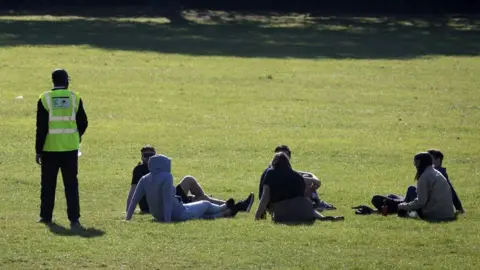Covid marshals: Warning 'nobody knows' how they will work
 Getty Images
Getty ImagesMarshals enforcing coronavirus restrictions could be "invaluable" but "nobody knows" how they will work, a Police Federation chief has said.
Glen Teeley questioned the practicality of getting councils and police to work together "with such short notice".
Stockton Council leader Bob Cook warned the plans lacked detail and had "caused a lot of confusion".
The government said it was "encouraging the introduction" of marshals to make people feel safe.
But it had not consulted local authorities about the plans before announcing them, Mr Cook said.
"Things would be a lot clearer if the government would actually talk to local councils before making such announcements," he said.
The government had sent no further details and had not said who would be funding them, the Labour leader added.

- SOCIAL DISTANCING: What are the rules now?
- SUPPORT BUBBLES: What are they and who can be in yours?
- FACE MASKS: When do I need to wear one?
- SOCIAL LIFE: Is it safe to go to the pub?
- LOCAL LOCKDOWNS: What happens if you have one?

The new marshals could be volunteers or council staff and their responsibilities would include directing pedestrians, providing information, cleaning touch points and preventing groups mixing.
They would not have the power to enforce social distancing or issue fines to anyone who breaks the rules, the Local Democracy Reporting Service said.
Mr Teeley, the chair of Cleveland Police Federation, said wardens could be useful if they checked breaches so police did not have to "turn up to everything".
"If they're used properly, they could be invaluable to us but nobody knows - and nobody knows how they're going to communicate with us," he said.
A government spokesman said: "We are encouraging the introduction of marshals to help support our high streets and public spaces, making sure people feel safe to enjoy them.
"Some areas of the country have already introduced marshals to support the public in following the guidelines in a friendly way and we will be working with councils to see where else they are needed."

Follow BBC North East & Cumbria on Twitter, Facebook and Instagram. Send your story ideas to [email protected].
